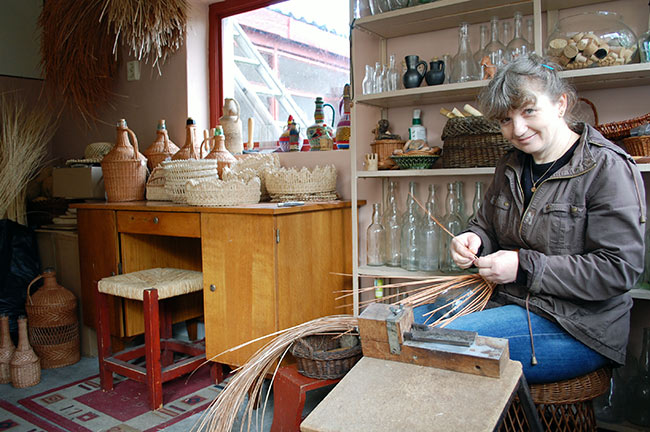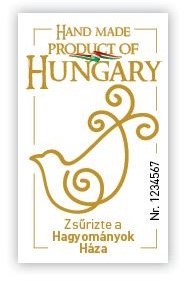Ircsi Bene, a basket weaver and craftsman from Kishunfélegyháza, was elected one of the best craftsmen of the Carpathian Basin. His work was awarded with the "Pomegranate Prize" at the last National Folk Art Exhibition. He earned the award for his ornamental glass weaving, which is unique in the world. Talent is the kind of gift that requires above-average special skills, creativity and deep commitment. Ircsi Bene is one of the lucky few who can claim some of these qualities. She grew up in a family where everyone was devoted to a craft. Her father was a handyman, her mother still embroidered and weaves carpets, her aunt made her living in embroidery and her brother trained as a decorator.

- I have been attracted to handicrafts since childhood, I became a ceramics enthusiast in primary school, so I went to art high school, where I graduated in ceramics, and later worked as a porcelain painter at the porcelain factory in Kecskemét, Budapest. I went on maternity leave from there, but the factory closed down in the meantime, so I had nowhere to go back to - said Ircsi Bene about the beginning of her career.
- I am a mother of a large family, I stayed at home with my three children for a long time, but I missed work a lot. That's why I decided to go to work in the summer at the Handicraft Farm in Jászszentlászló, where I could take the children with me. I got a job in the toy workshop, because the pottery workshop was already taken. They thought that a mother with a big family would not be able to manage the play house. I collected materials for the workshops: straw, shawl, wicker, whatever was available in the area and whatever was cheap. I really liked these playhouse activities, I went to Jászszentlászló for years. I fell in love with it so much that I started to research and study the subject. I enrolled at the school of folk arts and crafts in Budapest. Since there was no course in straw, shawl and wicker weaving, I applied for the course in basket weaving and wicker furniture making. I passed the vocational exam and then I also got the qualification of a teacher," said Ircsi, who also said that she later learned straw, shawl and wicker weaving from old masters. But as luck would have it, she was destined to weave decorative glass.
- I went to Tiszaalpár to learn basket weaving from János Kanalas and Auntie Éva Jánosné Kálmán. Tiszaalpar has a great tradition of this craft, which was initially connected with fishing. Baskets were made to store fish, and later they spread to peasant households, where vegetables and fruit were stored and transported in baskets. The cottage industry system was later built on this tradition. Almost every family worked in a cottage industry cooperative. The whole family did its share in basket weaving," he added.
- Where hundreds of people are engaged in a trade, a few craftsmen are bound to emerge. This was also the case in Alpár, where Mrs. Éva Jánosné Kálmán became one of the masters of decorative glass weaving. From her I was able to learn a craft that no one else in the world is doing today. Her uniqueness and speciality lies in the structure and system of glass weaving. Another thing that makes it unique is the special material, we use a rabbit's foot for weaving. Its habitat is in rapid decline, and it is therefore a protected plant. It grows in a very special place: on moist sandy soil. In our area it is found in fewer and fewer places, for example in Félegyháza there is only one such bush," says Ircsi, who knows the area like the back of her hand.
Collecting the raw materials is a very time-consuming task. While it takes two days to spin a bottle, it can take up to a year to find the right raw material. Every spring, Ircsi travels the countryside, pruning the bushes and using the fresh shoots only a year later, the following spring. But the folk craftswoman never slacks off, if there are no sticks, she makes ornaments from shawls, straw, wicker, or teaches children and adults.
Piroska Vajda
Source: baon.hu Petőfi Népe
February 09, 2016.









